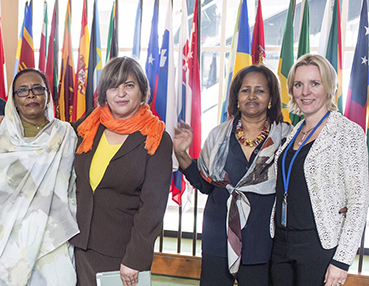Hivos travelled to New York this week to participate in the High-Level Review of UN Security Council Resolution 1325 on Women, Peace and Security that is taking place on the eve of the resolution’s 15th anniversary. In this visit, organised as part of Women on the Frontline programme, Hivos joined forces with Karama to advocate for greater participation of women in the Middle East and North Africa in peace and security decision making, and to demand that states are held accountable to what they signed up for.
The historic resolution 1325 adopted on 31 October 2000, not only recognised that women are adversely affected by conflict, but also that women are an untapped resource for peace building and post-conflict reconstruction. While the resolution itself might have been groundbreaking, its implementation in the Middle East and North Africa leaves much to be desired. Putting the resolution into practice is at the discretion of states but on the ground, the will to do so appears to be lacking. The Women on the Frontline and Karama delegation highlighted this shortcoming during high-level meetings and conversations with the media.
During a press briefing on 13 October the delegation – all women directly affected by current conflicts in Libya, Syria, Iraq, Sudan, and Palestine – presented their views and recommendations on how best to create momentum behind the implementation of 1325 in the Middle East and North Africa. This included a call for a more coherent and holistic approach addressing root causes of conflict and extremism. As Hivos partner Dr. Mouna Ghanem, founder and coordinator of the Syrian Women’s Forum for Peace, stated: There will be no peace in Syria without development. We want to a humanitarian zone in Turkey to support the Syrians and build resilience in the communities preventing them from fleeing to neighbouring countries or radicalize and join ISIL.
The delegation also emphasised that women are the eyes and the ears of their communities. To fight extremism, you need to work with women leaders. They know what it takes to build resilient societies and they are developing a new discourse to work on sustainable and lasting peace by engaging the communities and by focusing on demilitarisation.
To view the press briefing that was facilitated by the Permanent Mission of the Netherlands to the United Nations, see the video below:
Speakers were: Dr. Mouna Ghanem, Founder and coordinator of the Syrian Women’s Forum for Peace (Syria), Fatima Outaleb, Director of Union de l’Action Feminine’s women’s shelter and a member of its Board of Directors (Morocco), Amal Bugaighis, Attorney and Co-founder of the Libyan Human Rights Association and the Committee of Women Support to Participate in Decision Making (Libya), and Dr. Lily Feidy, CEO of Miftah, the Palestinian Initiative for the Promotion of Global Dialogue and Democracy (Palestine).




